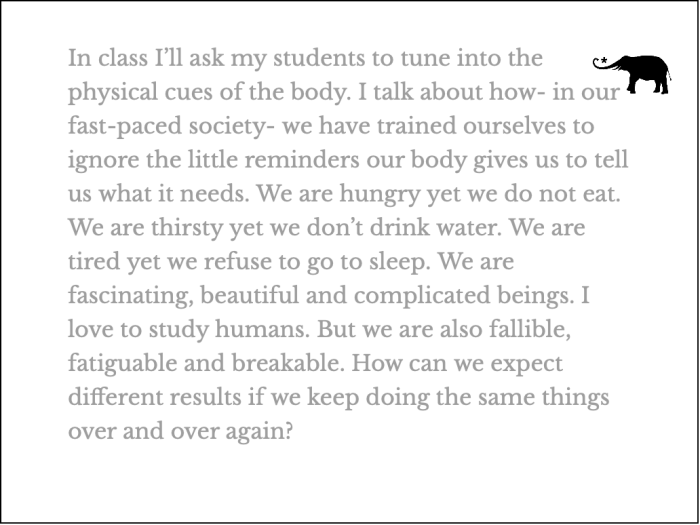“If you do what you did, you get what you got.” -Anonymous-
I was sitting at my desk with the morning sunshine streaming in. I try to start each day with some type of what I like to call “spiritual reading.” As I read through Rolf Gates’ Meditation From the Mat, this quotation jumped out at me and hasn’t left the forefront of my mind since. A seemingly simplistic reminder, I find that I can’t stop mulling it over- what does this mean? For myself as well as for those in my life who are seeking guidance?
I am a student and teacher of yoga. It is a huge part of my life and as a result I often find myself listening to the daily problems of my students and just as often putting my own life under the microscope of self-examination. Is it possible that all of the answers we are searching for are buried within this lines of this simple text?
One thing I love about this quotation is that we are not being asked to assume a positive or negative standpoint from which to view our lives. In practice I invite my students to “release judgement. Release the need to attach a positive or negative evaluation to what you are experiencing.” This wise Anonymous tells us that if we are feeling satisfied with our current state of affairs then we should just keep on doing what we are doing. But- if we find ourselves complaining, day after day that things aren’t quite up to our satisfaction, then perhaps its time to try doing something different.
“If you do what you did, you get what you got.”
There’s a bit of the age-old colloquial “definition of insanity” echoing in these words. If we keep behaving the same way and expecting different results, haven’t we already set ourselves up for failure?
Here’s a simple example: If staying up late every night is causing me to feel exhausted day after day, perhaps the change can be to go to bed earlier. We’ve all heard it one thousand times. Go to bed earlier, eat clean, don’t watch tv right before bed. We get it. Blah blah blah.
But- do we actually get it? Like, seriously?
Do we really believe that if we made some minor changes that we might be able to have a more fulfilled and happy life? Which brings me to an even bigger question: do we want to have a happy life? Are we fearful that if we make the changes and find happiness that we won’t know how to function in our own world anymore?
In class I’ll ask my students to tune into the physical cues of the body. I talk about how- in our fast-paced society- we have trained ourselves to ignore the little reminders our body gives us to tell us what it needs. We are hungry yet we do not eat. We are thirsty yet we don’t drink water. We are tired yet we refuse to go to sleep. We are fascinating, beautiful and complicated beings. I love to study humans. But we are also fallible, fatiguable and breakable. How can we expect different results if we keep doing the same things over and over again?
“If you do what you did, you get what you got.”
We all have an area of our lives we can apply this to:
If I speak to my spouse the way I always speak to them before a fight, we will have a fight.
If I don’t secure the gate, the dog will get out.
If I eat a healthy dinner, I will wake up feeling more energized.
We get the drift here. But it’s more than just saying to yourself, “yes, that’s true, I’ll be better.” There is no “better” here. No “shoulds.” There are only actions and outcomes. Decisions and consequences. What we do, and what we get.












Read 0 comments and reply